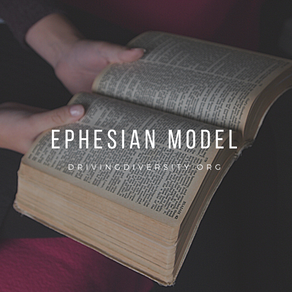 We sat silently at a downtown coffee shop, swirling the Rwandan brew in our cups, the Cincinnati skyscape towering over our sidewalk table — two Ohio Assemblies of God pastors sharing hearts and vision. He asked, “How would you counsel me to lead my (midsize, suburban) congregation into a multiethnic future? I feel a profound burden to do this. We can’t stay where we are. Our city needs this. Our church needs this. But I don’t know what I don’t know.” This wasn’t the first time I’ve heard this. It seems God is burdening many hearts these days for church reflecting heaven on earth. Our own story as Peoples Church Cincinnati involves a 20-year transition from a 98 percent homogeneous white commuter church to a 50 percent nonwhite congregation comprising 30-plus nations. And despite the racially charged times in which we live, we are 25 percent African-American. The Lord has done this. As I contemplated my friend’s earnest question, I felt stirred to reply, “Start with theology. Whatever you do, root it in Scripture. Hell will fight you on this, and when it does, you want this vision anchored in God’s Word.” I shared from Ephesians 2 and 3 about a biblical model of a multiethnic church. The intensity of God’s mind on this matter captivates my heart and astounds me. The Ephesian Model New Testament Ephesus compares to today’s American society. With a mix of Gentile God-fearers, conservative zealots, marketplace liberals, idol worshipers, indigenous people, and internationals, the city was ethnically, economically, religiously diverse. This port population center on the western edge of what is now Turkey flourished as a cosmopolitan melting pot, the Roman Empire’s third most influential city. The Ephesian church was also a collective — united in Christ, Spirit-filled and gospel-rooted. This diverse congregation was making known the “manifold wisdom of God” — in the city and “in the heavenly realms” (Ephesians 3:10). Did you catch that? Not only was the church influencing society and spreading the gospel, but its Christ-centered existence in diverse unity was capturing attention in the spiritual realm. Paul calls this diverse unity of formerly disparate and hostile Jews, Greeks and Romans the “mystery of Christ,” which the Holy Spirit revealed (Ephesians 3:4-6). As this church came together, the mystery of Christ, hidden for ages, became apparent. Let that sink in. Our fractious United States could benefit from the same prophetic, reconciling Kingdom congregations. Such a movement would shake the gates of hell. In Ephesians 2, Paul provides a compelling vision and model for diversely united churches in our day. After unpacking the gospel, he links it to the idea of a diversely united local church. This message is applicable to your church setting — whether rural, suburban or urban. Continue reading here (Used with permission)  So, I'm turning 50 today. Not as old as some and lots older than others. My fifteen year old daughter told me yesterday, "How old are you gonna be Mom, 50? Dang! ...That's not so old." That about sums it up. Age is relative. It is one's relative place in their journey of life. And as I turn 50 today I'm thinking about the journey of my life, the journey of driving diversity in Christ's church, which is a huge part of the call God has placed on my life, and about journey's in general. Can I share these thought with you? . We are all on a journey. It starts the day we are born and ends the day we enter eternity. As the old poem says, “Only one life, ’twill soon be past, Only what’s done for Christ will last.” Like life, living out God's kingdom on this earth is a journey. In my work training and coaching leaders to partner with the Holy Spirit to see God's kingdom diversity in their local Christian communities, I stress this element of journey. We all begin somewhere, we are all at different spots on the journey, and we all need to keep moving forward. These are simple thoughts, but essential ones none the less. 1. We all begin somewhere. When I was 11 I had a friend who took piano lessons. I wanted to take piano lessons too but I thought I was too old, so I didn't pursue it. Sometimes we talk ourselves out of starting a journey because we feel we are already so far behind, there is no point to starting it now. Here is the truth. God's will for his people is unity and holiness. A segregated church is a contradiction in terms. It doesn't matter that you haven't done anything in this space before, start today! It is never too late to partner with our Father in something he desires. This is actually our job as his servants. 2. We are all in different spots. I don't know why, but our relative places in the journey of kingdom diversity is often a point of contention, judging, and frustration. Sometimes, those who are farther ahead look at those who are farther behind or haven't started at all with very little grace or kindness. This hinders the progress or start of these individuals. If you have a passion for God's kingdom diversity, I beseech you to let that passion drive you to bring others along with you. Pray for the stubborn or those who don't see it or get it. Prayer is powerful. Share, encourage, entice, challenge, teach, beseech, in other words, let the Holy Spirit use you to minister to his people where they are and move them along to where HE wants them to be. After all, they are not our people to judge or get frustrated with. In my fifty years, which like my daughter said, "that's not so old" I have seen many brothers and sister who didn't seem to care, suddenly start the journey and become heralds and advocates. Unfortunately, sometimes they too will fall into the trap of criticism and frustration; perhaps because this is what was modeled to them. Love is ever hopeful. Let's love each other in this way. 3. We need to keep moving. Before we had kids, my husband and I used to backpack. It's an interesting experience fraught with good life lessons, the simplest of which is, if you just keep going eventually you'll get there. Simple right? It is simple. Diversity in God's church is not easy. It is a battle. Mostly it is a battle of dying to self, denying to our preference, privilege, and power. It's work. It's more than we think it will be when we start. The important thing then is to keep moving forward. If you just started, move forward. If you have a beautiful multi-ethnic community, move forward. If you have a beautiful multi-ethnic community with profound, authentic, transparent, loving relationships, keep moving forward If you have a beautiful multi-ethnic community with profound, authentic, transparent, loving relationships that is working together to manifest God's kingdom of justice in your larger community, keep moving forward. Basically, there is always a next step. We provide the diversity development rubric to help leaders learn the fulness of God's kingdom diversity and how to move forward in it. Yes, it's work for a lifetime, but you can get where our Father desire's you to be, if you just keep moving forward. Today is my birthday. They'll be celebrations and gifts (my kids put them on the dining room table last night). Tomorrow, will be another day. I won't be celebrating the milestone of 50, but I'll be moving forward none the less, hopefully I'll have influence in somebody's life in some way as I choose to walk in his kingdom ways. That's really all I can do in this journey of life. 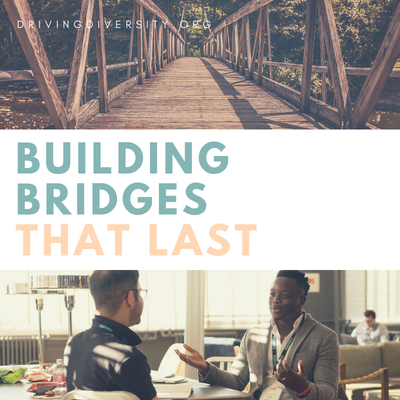 Every day workers in a certain town crossed a shallow river to collect wood. This wood provided raw materials, heat, and trade goods. Although wading through the water was inconvenient, wet, and often exhausting, the laborers bore the heavy load to provide for their town. One day a businessman from a neighboring town arrived to conduct his trade. Upon seeing the laborers struggling to cross the water, he resolved to build them a bridge. After all, the wood business was highly profitable and this new bridge would buy immense goodwill with the town’s mayor. Upon meeting with the businessman, the mayor immediately granted permission for the bridge. Although no one consulted the laborers, this was hardly noticed as excitement spread to other towns nearby. If the businessman made this village a bridge, perhaps he would build others too. When the bridge was finished, the businessman and the mayor held a celebration. The abundant supply of wood raised the fortunes of many in the town. The businessman went home congratulating himself on a job well done. But a few months later came the rainy season. The river banks swelled, the waters rose, and the bridge’s foundations washed away. Nothing was left of the new bridge. The town was devastated. Some blamed the mayor. The mayor blamed the businessman. The businessman mysteriously cut ties with the town and disappeared. The laborers bickered among themselves and some of the laborers refused to go back to wading through the river. Many in the town discussed building a new better bridge but without the financial support of the businessman, they felt they didn’t have enough resources. After several years, things returned back to the way they were before. Until one day a new businessman came to town. Many of us often function like the businessman. We enter situations in which we have limited knowledge and immediately see a problem. After hearing the complaints and seeing the issues, we set about immediately to solving them. But often times, we don’t know what we don’t know. The businessman couldn’t have known how high the river would get during a peak storm. He couldn’t have known that the mayor may not have the best interest of the people in mind. He didn’t know that some of the laborers had some concerns about the bridge, but didn’t feel empowered to share them with him. And although the businessman thought he was helping, in the long term, his act of goodwill actually set back the whole town. Instead of believing that they could build their own bridge, many in the town believed they needed the help of a powerful businessman to do it for them. When it comes to cross-cultural ministry and creating multi-ethnic communities, we should be aware that many problems are not easily solved. What might seem like bright solutions may actually be more like bandaids. We might think we are helping when are actually not helping at all. None of see the whole picture. And certainly, none of us have the power to change human hearts and minds. Only God knows what people need. Only He knows how to solve the difficult problems facing the world. Although we are often clueless outsiders, he is the Ultimate Insider who became flesh. He dwelt among us, overcoming sin and defeating death. You and I don’t have all the solutions. But we do have a God who does. So when a student from a different background has a problem, we can learn to listen. When there are controversies on our campus, we can first listen. When our best efforts are met with attitude instead of gratitude, we can listen better than ever before. Because we want our bridges to last. We want them to survive the next storm. We need God to provide the foundation, God to build it, and God to sustain it. As we listen to Him and honor one another in Christ, He will do it. 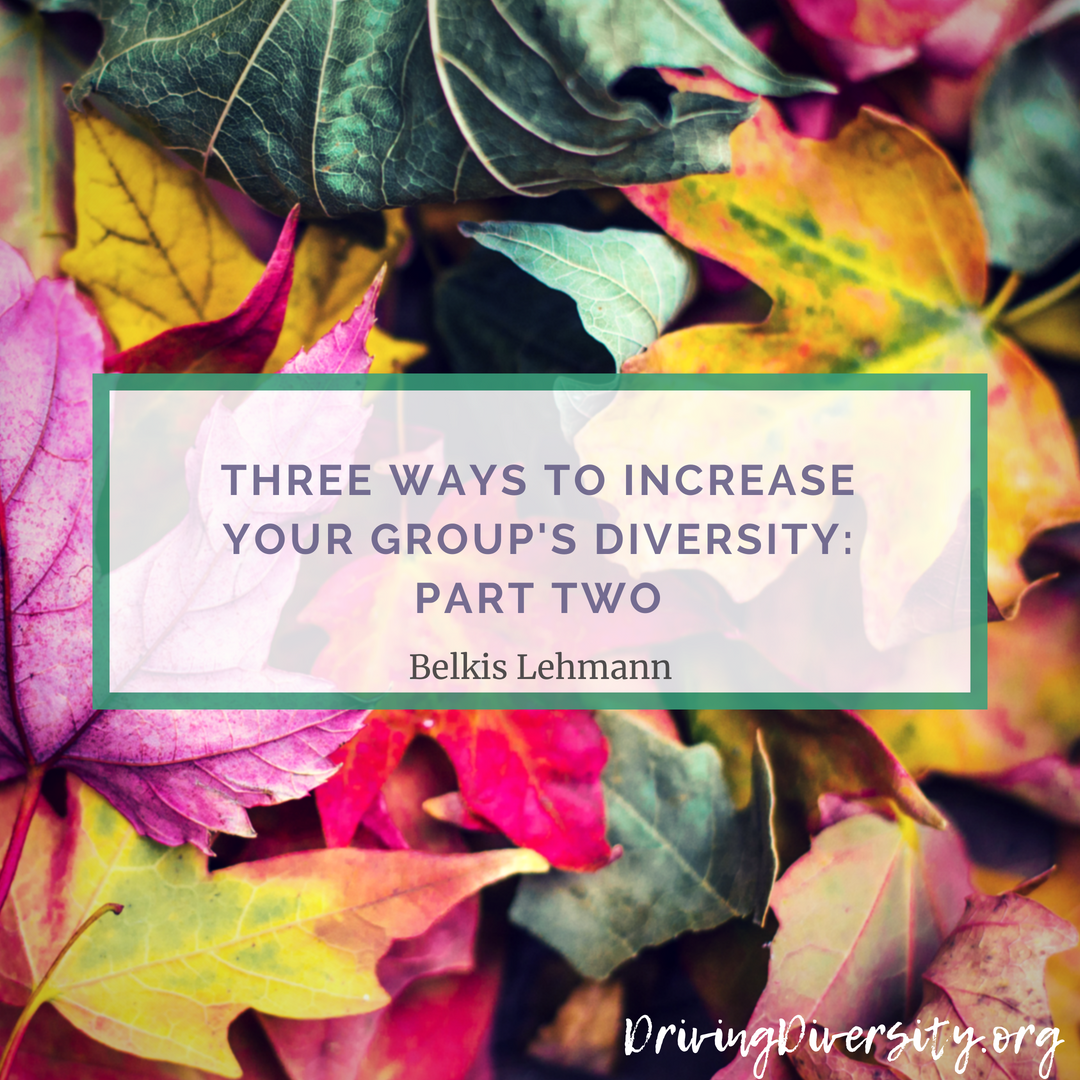 The second way to increase diversity in your group is talking. In the same way that you get what you pray for, you also get what you talk about. So talk about diversity with your staff team, your student leaders, your students- just talk to everyone. Talk about why God cares about it. Talk about who’s missing in your group. Talk about what need to change so you can how to attract, integrate and serve a wide variety of people. Talk in your large group meeting. Share the vision for Kingdom diversity through times of teaching and challenge. Celebrate small victories. We value what we celebrate. While you celebrate be honest about where you are. It’s ok to tell the truth and recognize the long road ahead. This will actually increase your credibility. Be open about your diversity dreams and your current stage. It’s okay to say “I know our music tonight may not be what you’re used to. It is our desire to have a more multi-cultural worship experience because we value every culture and know our Father is revealing himself to every nation, tribe, people and language. We need the fullness of God’s people to be an accurate representation of God to this campus. Thanks for hanging in there with us while we journey forward. This also means we need you and your help to truly be a family.” Your talking should include:
Since you get what you talk about, you need to talk about diversity a LOT if that’s what you want. Need help? We have resources. Reach out. We are here to help. 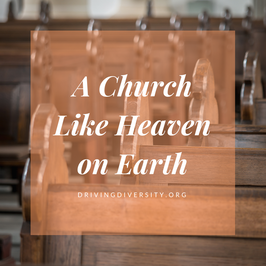 In recent years, racial tensions have torn at the fabric of this nation. From city streets to university campuses, an atmosphere of simmering resentment reminds us that we don’t live in a post-racial society. The reality of this is even evident in many of the churches in which we worship. This became apparent to me personally during my first year as lead pastor of (then) First Christian Assembly of God. It was April 2001, and Cincinnati was burning. The unrest started when police killed an unarmed teenager of color. The city was slow to respond, and the anger spilled into the streets. The local government instituted a 6 p.m. curfew for several days to restore order. God had been working in my heart for years that our church needed a big change. We worshiped at the geographic heart of our city, just one mile from the fires and breaking glass during that week of unrest. Yet the congregation was a homogeneous 98 percent white commuter church. Not only was there a demographic dissonance for me, there was a biblical dissonance. Hadn’t Jesus died to create “one new humanity” through the power of the Cross (Ephesians 2:15)? Couldn’t a reconciling Church be the missing component in our nation’s racial strife? Was the racially segregated church unwittingly contributing to the problem? Even worse, were we as the American Church actually devoid of the most compelling evidence that the gospel is true (John 17:20–23)? These questions caused a wrestling in me that led to a major transformation for our church. Those changes didn’t come easily, and there were a lot of things to learn along the way to becoming Peoples Church Cincinnati. Today, our congregation is rich in stories and testimonies of racial reconciliation. Allow me to share a snapshot of what we’ve experienced. Continue reading here (taken with permission) 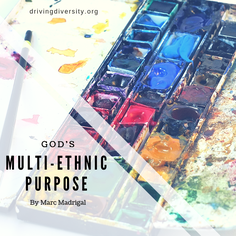 We are not the same. We each come from different backgrounds, experiences, and cultures. Some days it can seem like all these differences are more of a curse than a blessing. If only I was like everybody else, then I would fit in. But God often uses people who don’t fit to advance his kingdom. He picks the people who do not belong to do what cannot be done. Here are three quick examples. Moses was a Hebrew raised like an Egyptian. He ate at Pharaoh’s table and dressed in royal garb. But by blood, he was a Hebrew. He was born to a slave. Although he lived like a member of the royal household, we know deep down he still cared about his people. Eventually he lashed out and murdered an Egyptian who was oppressing his people. His fellow Hebrews wanted nothing to do with him. Neither a true Egyptian royal nor an authentic Hebrew, his identity crisis caused him to flee into obscurity for forty years. But God had a plan for him. Moses alone could demand an audience before Pharaoh’s court and claim a shared heritage with the people he would lead. Among the Hebrews of Egypt, he was not the same. Scripture tells us of an unlikely queen. As a Jew living under the Persian Empire, Esther’s beauty gained the attention of King Xerxes. But even as the crown was placed on her head, her true identity remained a secret to all. No one knew she was a Jew. But when a plot arose to destroy her people, Queen Esther held a unique position of influence and privilege. She alone of all the Jews could gain an audience with the King. She alone could convince him otherwise and thwart disaster. Through her talent and courage, God saved the Jewish people. Among the Jews of Persia, she was not the same. Half-Greek and half-Jew, Timothy stood out as an anomaly. He may not have been pure enough for real Jews or Greek enough for real Greeks. But when the Apostle Paul came to his hometown, carrying a unique message of reconciliation for both Greek and Jew alike, Timothy was exactly the partner Paul was looking for. To gain credibility for their journey, Timothy immediately endured the pain of adult circumcision. A bi-racial Timothy accompanied Paul to great evangelistic success and eventually shepherded God’s church like very few in the New Testament. Among the Greeks and Jews, he was not the same. As I look over these three stories, I can’t help but come to a fascinating conclusion: if God wanted us all to be the same, he would have made it so. Instead, he created us differently. He positioned us in unique situations. He made us credible, trans-cultural, and distinct among certain people in certain places. He did this because He has a greater purpose than what we might initially realize. Some of us have been given an ethnic identity that doesn’t always match our surroundings. We wonder why we stick out. We think we need to become something we’re not to survive. We may at times grow frustrated by a nagging inability to feel at home among our own people. But perhaps what appears to be a disadvantage is part of the plan. Moses wasn’t like the other Hebrews in Egypt. Esther wasn’t like the other Jews of Persia. Timothy wasn’t like the other Greeks. They weren’t the same and neither should you be. 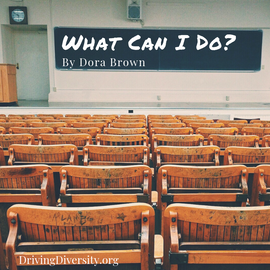 What do Yolanda Adams (Gospel Artist), Michael Strahan (NFL), Barbara Jordan (US congressional representative), Mickey Leland (Activist and Congressman) and Belvin Perry (former Chief Judge) all have in common? These, among many other notable artist, physicians, judges, politician, US and state representatives, activists, lawyers, and NFL players and coaches, all graduated from Texas Southern University. TSU is a university birthed from a small private junior college that has become one of the most comprehensive and largest historically black universities in the nation. TSU is noted for its law, justice, public affairs, and athletic programs, but how can TSU be known for loving God and spreading the Gospel? Three years ago, as I was walking past the campus after a school shooting, I thought to myself, “Oh God, What can I do?” Seeing the hurt and fear in the students eyes and knowing that this was only one in a series of incidents that were happening on the campus, I knew that God was the only way that this campus would heal and change. I was just an intern with Chi Alpha at the University of Houston (a university two blocks away) and wondering what could I do that would make a difference. That year I talked to my small group about how much I wanted to see God move at TSU, and a few of the girls in my small group caught the vision. That summer we started doing weekly prayer walks on the TSU campus and having intentional conversations with students. Before the summer was over, almost 15 UH students were meeting weekly to pray for and meet students at TSU. The next year we had six faithful TSU students plugged into our small groups. PRAISE GOD!!! My heart is to see TSU have a Chi Alpha of their own. One that has just as much TSU DNA as Chi Alpha DNA. The Lord has definitely used this experience to challenge my thinking and the way I minister to students. Am I teaching cultural Christianity or Biblical Christianity? Am I being an active listener? Am I stepping out of my comfort zone when engaging with students? He’s also given me creative ways to meet students and start up Godly conversations. Something I've realized through this experience is the need for minority missionaries and US missionaries that will go outside of their cultural comfort zones to minister at HBCUs. I'm grateful that the Lord is raising up those who are saying “I will go”, and those who say “I will train.” Both are crucial for what the Lord is doing. The Lord has faithfully answered my question and taught me ‘what I can do’: always be willing to learn and serve others. So, in reading this, I hope you will begin to ask yourself the very same question I asked myself three years ago: “What can I do?” 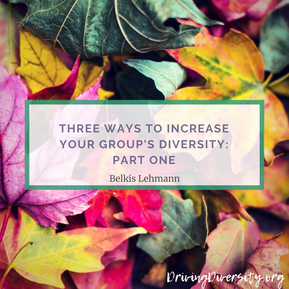 Note: This is written for a Chi Alpha audience, but can apply in any ministry context. Are you dreaming of the multitude of every nation, tribe, people, and language and longing to see God’s kingdom reflected in your local Chi Alpha group? Over the next three weeks we will expound on three simple and proven ministry truths to begin and to make progress in a Holy Spirit transformation in your community. Our first ministry truth is this: you get what you pray for. #1 You Get What You Pray For Jesus said, “Without me you can do nothing.” He wasn’t referring to activity. We are very good at doing stuff on our own. He was referring to fruit, fruit that lasts. (John 15:16) To see eternal change in the lives of human beings, we need the holy sap of Jesus’ life to flow through us, and this requires prayer. The first, second, and last place to accomplish anything of significance is prayer. If you want to be a different kind of group, one that represents your campus and more importantly God’s kingdom, you need divine help. I truly believe you get what you pray for, so pray for… Pray for revelation. Before we can share the vision for diversity, we need a personal revelation of what it means. Diversity is a word that has many definitions in our world, and though we do not find it in the Bible, we certainly find the model of multi-ethnic, unified communities living out a kingdom ethic. Revelation is the product of prayer combined with reading and study. As you delve into God’s word, pray for revelation for yourself, your fellow staff members, your student leaders and every student in your group. Pray for deliverance. There are reasons our churches are racially and ethnically segregated. Some have to do with preference and tastes, but much has to do with sin. The sins of greed, lust, and power birthed the sin of racism in the United States. We cannot build communities that reflect God’s kingdom without deliverance, and we will not experience deliverance without repentance. Repent for your own prejudices and racism. It is also Biblical to repent on behalf of your nation (people group) and country (place where you live) (Daniel 9:3-19). Pray for deliverance from strongholds (entrenched ways of thinking) that influence many of us without our knowledge. Pray for freedom from the world’s ways of thinking, to no longer see anyone from a worldly point of view (2 Corinthians 5:16). Instead pray for new ways of thinking (Rom 12:2). Pray for kingdom-minded hearts. Many who love the vision of kingdom diversity don’t act on it for fear of what will happen in their groups or churches. How will my leaders and congregants respond? In a homogenous group, everything is tailored to the dominant group. How will that group feel when confronted with unpleasant truths and eventual changes? It is vital that you take the time to pray for kingdom-minded hearts. Pray in faith knowing that as you undertake your own journey of allowing God to renew your mind and transform your perspectives, you will be sowing seeds for transformation to happen in others. Pray for protection. If there is one thing I have learned as I work to see our Chi Alpha groups accurately represent God’s kingdom on campus, it is that it is a battle. Anything you do, even if all you are doing is praying (and believe me that is enough), is a direct confrontation to entrenched spirits who have controlled our country for centuries. They have kept people and more importantly Christians separated. This separation, besides maligning the name of Christ, has limited the church’s effectiveness in world missions, reaching cities, executing justice, and yes, this is true even on our campuses. Your confrontation to these powers and principalities will not go unnoticed or unopposed. Pray for protection of your relationships (for this is where retaliation tends to come), your unity, and your community. Guard all your relationships and don’t give way to misunderstandings, wounds, pride, and any kind of unforgiveness. Pray for wisdom. In addition to prayer, there will be things you will need to do and changes you will need to make to see God’s vision for your group come to pass. You can read books and get counsel, but deciding what to do and how to do it will require divine wisdom. These can be difficult waters to navigate. Everyone has an opinion on “diversity issues” and pretty much thinks theirs are right. Confronting strongholds, acting out our repentance, and making intentional changes in what you do, all require enormous amounts of wisdom. Take heart! God promises wisdom to those who ask for it (James 1:5). Pray for partners. Transforming a group from homogenous to multi-ethnic is spiritual work--a work of the Spirit. It is something He alone can and does do. But he also uses vessels like you. However, you alone are not enough. In this case, the goal is also the strategy. Your goal is to see a multi-ethnic body on campus. You must find partners from underrepresented ethnic groups. How? Pray. Pray specifically for what you need and remember you are not praying for something you want, more importantly you are praying for something our Father desires. You are praying as Jesus taught his disciples, “Let your kingdom come and your will be done.” For this is his kingdom and this is his will. You have a dream, a vision, a driving desire to see our Father’s kingdom reflected in your Chi Alpha group. I am ecstatic! I know that our Father is also pleased. After all, it is his kingdom we are representing. And that is what we must remember. It is his kingdom. He is the one who builds it, we are merely his partners and that partnership begins in prayer. This is the place we receive revelation, deliverance, wisdom, kingdom-minded hearts, and protection. This is where we pray for these for others and where God releases others to partner with us. Pray in faith! You get what you pray for. One new humanity. There are many ways that I could come at this topic. There’s the story of our church, Peoples Church Cincinnati. There’s the theology of it. There’s the societal need for it. There’s the need of the Church itself, to become who she is called to be to accomplish what she’s been purchased for, by His blood. And oh, how the earth would be different, and will be, different. All of these are different angles from which we could come to the content of this blog post.
But let me start with the story in Acts 20. We can all see that for ourselves. Paul calls for a meeting of the elders of Ephesus. He’s on his last trip back to Jerusalem. His last time ever. But on the way back he has the ship pull into the harbor at Miletus, and from that coastal town calls for a meeting of the Ephesian elders who come down from 20 miles or so north. It might be good that you take a minute to read the story. Paul pours out his heart to the elders. He reminds them of all that he has taught them. The complete plan of God, the whole will or counsel of God. He warns them with all intensity; defend what you’ve been given! People will try to tear this up. Don't let it happen! What was it that so drove Paul to make such an energy-consuming stop to make sure he had this final meeting with the Ephesian crew that he’d already lived among and taught so earnestly for three years? What was this “complete plan” that Luke has Paul referring to in Acts 20:27? Before we drive into the answer to that question allow me to share another story. The story of two temples, starting with the one in Ezekiel. If you're like me, you’ve always wondered what is this temple? After all, it’s never been built. And yes, we have made some attempts at fitting it into certain eschatological frameworks, but at a very basic level, it’s just confusing! No one knows what it means! Why has God gone to such detail to have Ezekiel describe this never built temple? Not only has it never been built--it’s not Solomon’s temple, nor Ezra’s, nor Herod’s--but it seems to pre-figure a temple in the New City, the Revelation 21-22 new Jerusalem, both with living water flowing from them with trees on both sides of the river for healing. There’s just ONE PROBLEM: Revelation 21:22 says there's NO TEMPLE in the city because the Lord God Almighty and the Lamb are its temple! So, what is this temple in Ezekiel? Could it be a prefiguring of the temple of the Lord in the New Covenant, the people of God? I was studying Ezekiel 43:10 and seeking the Lord in preparation for writing a book. I couldn’t leave Ezek. 43:8-11 for several days. Then this happened: As I was prayerfully meditating over Ezek. 43:10-11 for the dozenth time or so, “Son of man, describe the temple to the people of Israel, that they may be ashamed of their sins. Let them consider its perfection, and if they are ashamed of all they have done, make known to them the design of the temple--its arrangement, it's exits and entrances--its whole design and all its regulations and laws,” suddenly this hits me: He's not talking about a physical temple in physical Jerusalem, He’s talking about His people, the temple of the Lord. I immediately felt prompted to look at Ephesians 2:21, “In Him the whole building is joined together and rises to become a holy temple in the Lord.” Both Ezekiel and Paul are speaking spiritually about the same thing! Now, I was stunned. Two major inspirations were converging...Paul’s Acts 20 Ephesian elders meeting on the beach at Miletus (the complete plan of God talk) and Ezekiel’s 43:10-11 temple description. The Lord was telling Ezekiel, “make known to my people the whole design” of the temple, make known its perfection, and Paul was also saying, “I gave you the whole plan/counsel of God,” with tears and trembling, night and day over 3 years! Later, in his book to the Ephesian church outlining the plan in detail, Paul calls them a temple (Eph. 2:21). And both temples lead to living water rivers, in Ezekiel 47 and in Revelation 21-22, with trees on either side for the healing of the nations. For Ezekiel, it’s from under the threshold of the temple. From Paul and the New Testament “temple,” or Bride, it’s from under the throne of the Lord God Almighty and the Lamb who “are its temple” at the center of the Holy City (Rev. 21:22), the city also called a Bride (Rev. 21:9). Somewhere Jesus said, “In your own Law it is written that the testimony of two witnesses is true.” John 8:17 Now, again, if you’re like me you need some time to think on this and look at these scriptures for yourself. As you do, ask the Holy Spirit to illuminate to you what you are reading. He does that for us. He will do that for you. And if what I’m thinking is wrong, thanks for reading this blog post! Obviously, you can just ignore the rest of what I will share. : ) So what are we talking about? I’m glad you asked. I believe scripture reveals a comprehensive plan/purpose of God for His Church. How it’s designed, what it’s to be and what all it will do. I believe it’s a specific design set. And He refers to it as One New Humanity, a temple, a building, a Body, a Bride, and a Holy City. I also believe we’ve inadvertently, or sinfully, missed it. REALLY MISSED IT. So, in the blogs to come, we will unpack these things:
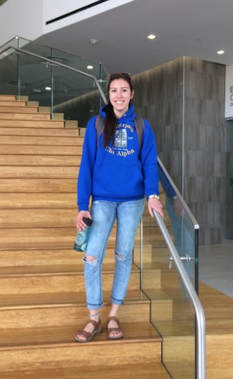 After the worst summer of her life, Bethany Baldwin decided her sophomore year to find a place where God could heal her broken heart. She then found an old Chi Alpha flyer. Hungry for God and for community, she knew just from the piece of paper that Chi Alpha was the place to be. The first service she attended changed her life. She quickly got connected with a small group and began reading the Bible on her own. Determined to attend grad school, she toured several campuses but didn’t feel God confirming her decision. At a West Coast SALT conference, she realized God had a different plan for her life: campus ministry. She began raising support and preparing to move 2000 miles to do her internship in Raleigh, North Carolina, but support raising proved to be a significant challenge. Bethany is from the Navajo reservation. She never attended church growing up. Most of her support initially came from other Chi Alpha friends. Struggling to finish her budget in time to begin the internship, her campus pastor told her about the Minority Mobilization Fund (MMF). After applying and being approved to receive funds, Bethany’s needs were met! Today she directs the XAi program at Northern Arizona University. She also has a heart for seeing Chi Alpha established in Las Vegas. This past Spring she led the first prayer team to UNLV where some doors are beginning to open. As she continues the work God has a called her to do, Bethany also gives back to the MMF knowing that those resources can help more missionaries fulfill their call. The MMF connects minority missionaries to their calling through anchor level support during their intern year. Not only does it help them raise their full budget, but it also instills a confidence that they can lead a lifetime of campus missions and are valuable to our movement. Thank you for supporting the MMF! |
Categories
All
Contributing Authors
|

 RSS Feed
RSS Feed